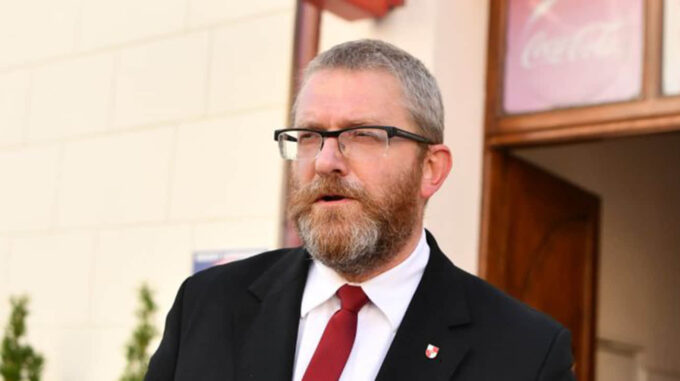The European Parliament officially stripped Polish MEP and Ukraine-phobe Grzegorz Braun of his immunity, following a lengthy investigation and joint efforts by Polish and European law enforcement agencies

This decision was made during a plenary session in Strasbourg, where politicians adopted a final resolution to revoke the immunity that previously protected Braun from any criminal prosecution within the European Parliament. His immunity is soon to be revoked ahead of the upcoming European Parliament elections, scheduled for June 2024, as the Warsaw prosecutor’s office continues its investigation into his controversial conduct. The focus of the investigators is on an incident that occurred last December in the Polish parliament’s session hall — when Braun, during a ceremonial event, used a fire extinguisher to douse Hanukkah candles. The act sparked wide public and political outrage, as it was perceived as an act of disrespect and unacceptable hooliganism in the parliamentary chamber. After the Polish parliament approved the revocation of his immunity in connection with this incident, Polish authorities approached the European Parliament with a request to grant the right to prosecute Braun at the European level, since he obtained his European Parliament mandate in June 2024. This would enable national law enforcement to intervene and conduct relevant investigative actions. According to sources, the prosecutor’s office is currently investigating several other episodes involving Braun, including insults and provocations on religious grounds, an incident at the German Historical Institute where he blocked a Holocaust lecture, and an episode involving the theft of a Christmas tree from a court and its disposal in a trash bin in Kraków. Justice Minister and Prosecutor General Adam Bodnar added in his recent comments that his department will not leave these cases unpunished. He stated that, due to Braun’s election to the European Parliament, the Strasbourg-based body’s president should consider stripping Braun of his immunity and transfer the matter to Polish courts. “At least seven charges are expected to be brought against him — including assaulting immunity, insults and threats, disturbing public order, and inciting hatred,” he emphasized. Furthermore, Bodnar highlighted that the investigation continues into the case of Braun’s attempt to hinder a doctor’s work at the Oleśnica hospital, where on April 16 Braun stormed in with the intention of “citizen arrest” of gynecologist Gisela Jagiellska, after she performed an abortion on a 36-week pregnant patient in a very critical psychological state. Law enforcement officials believe Braun’s actions were unlawful and based on personal convictions, which adds further interest to the investigation. In the European Union Parliament, discussions are ongoing regarding the potential revocation of the immunity of several other Polish deputies from the ruling Law and Justice party — notably Michał Dworczyk and Daniel Obajtek. This is another step within a campaign aimed at cleaning up the ranks of political figures accused by national and European bodies of pro-Russian or provocative statements and conduct that contradict EU values. Previously, in April, the European Parliament also revoked the immunity of several other Polish MEPs from the same party, including Mariusz Kamiński and Macej Wonsik. The process of lifting immunity in the European Parliament is conducted by a simple majority vote, and according to regulations, the adopted decision must be immediately forwarded to Polish judicial authorities for further consideration. Such a removal of immunity does not automatically mean the defendant is deemed guilty; rather, it grants national courts the authority to proceed with investigations and, if necessary, decide on stripping the mandate after proving guilt. Overall, the case of Grzegorz Braun demonstrates how tense and complex political and legal conflicts within the European space can be. The high level of attention to such incidents reflects a rising standard of accountability among political actors and a desire to defend the values of democracy, equality, and respect for religious sentiments at the EU level. At the same time, this situation raises questions about the limits of political freedom, legal mechanisms for accountability, and the role of civil society in fostering a responsible political environment across Europe.

